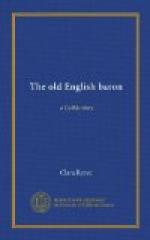They then separated; and the Baron, with his sons, returned to the sick man’s chamber; there he exhorted his brother, with the piety of a confessor, to repent of his sins and make atonement for them. He made known Sir Philip’s proposals, and observed on the wonderful discovery of his crime, and the punishment that followed it. “Your repentance,” continued he, “may be accepted, and your crime may yet be pardoned. If you continue refractory, and refuse to make atonement, you will draw down upon you a severer punishment.”
The criminal would not confess, and yet could not deny, the truth and justice of his observations. The Baron spent several hours in his brother’s chamber. He sent for a priest, who took his confession; and they both sat up with him all night, advising, persuading, and exhorting him to do justice, and to comply with the proposals. He was unwilling to give up the world, and yet more so to become the object of public shame, disgrace, and punishment.
The next day, Lord Fitz-Owen summoned the company into his brother’s chamber, and there declared, in his name, that he accepted Sir Philip Harclay’s proposals; that, if the young man could, as he promised, direct them to the places where his parents were buried, and if his birth should be authenticated by his foster-parents, he should be acknowledged the heir of the house of Lovel. That to be certified of these things, they must commission proper persons to go with him for this purpose; and, in case the truth should be made plain, they should immediately put him in possession of the castle and estate, in the state it was. He desired Lord Graham and Lord Clifford to chuse the commissioners, and gave Sir Philip and Edmund a right to add to them, each, another person.” [sic]
Lord Graham named the eldest son of Lord Clifford, and the other, in return, named his nephew; they also chose the priest, Lord Graham’s confessor, and the eldest son of Baron Fitz-Owen, to his great mortification. Sir Philip appointed Mr. William Fitz-Owen, and Edmund named father Oswald; they chose out the servants to attend them, who were also to be witnesses of all that should pass. Lord Clifford proposed to Baron Fitz-Owen, that, as soon as the commissioners were set out, the remainder of the company should adjourn to his seat in Cumberland, whither Lord Graham should be invited to accompany them, and to stay till this affair was decided. After some debate, this was agreed to; and, at the same time, that the criminal should be kept with them till every thing was properly settled.
Lord Fitz-Owen gave his son William the charge to receive and entertain the commissioners at the castle; But, before they set out, Sir Philip had a conference with Lord Fitz-Owen, concerning the surrender of the castle; in which he insisted on the furniture and stock of the farm, in consideration of the arrears. Lord Fitz-Owen slightly mentioned the young man’s education and expences. Sir Philip answered, “You are right, my Lord; I had not thought of this point; we owe you, in this respect, more than we can ever repay. But you know not half the respect and affection Edmund bears for you. When restitution of his title and fortune are fully made, his happiness will still depend on you.”




